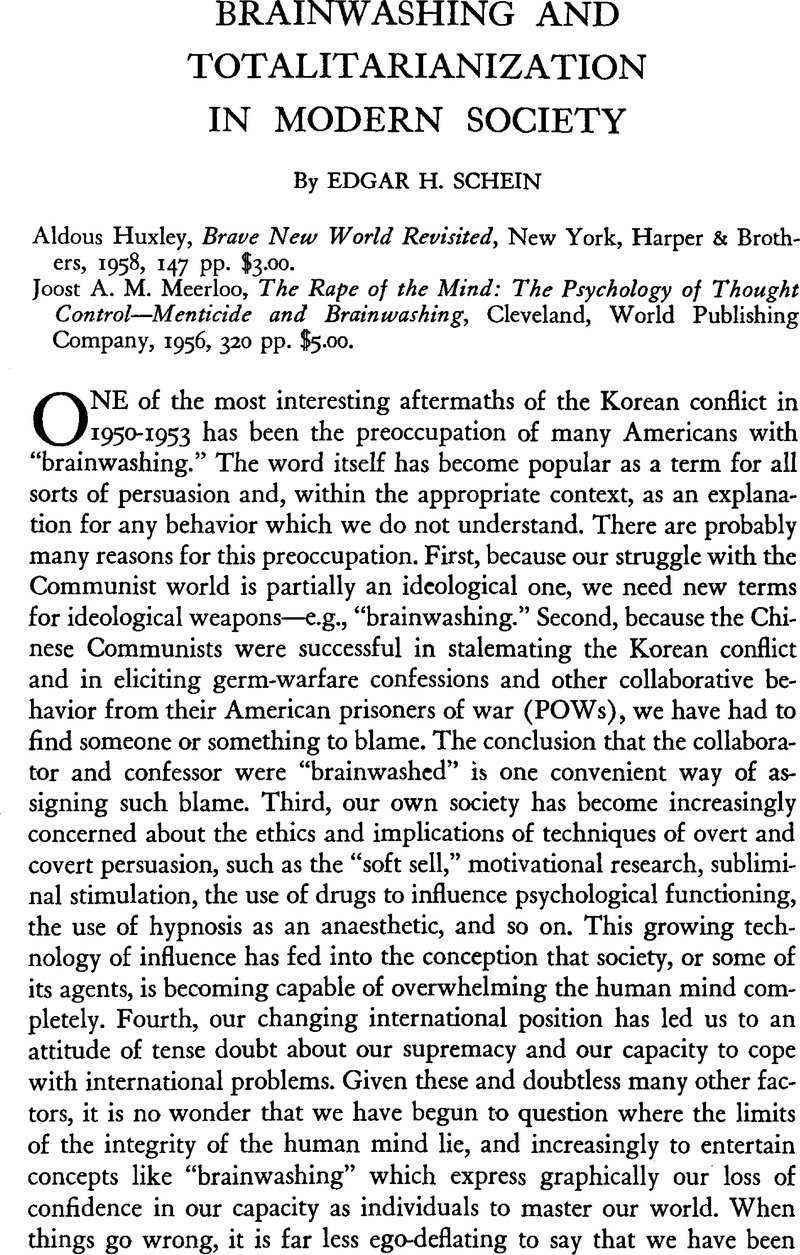Published online by Cambridge University Press: 18 July 2011

1 Huxley apparently was stimulated to write his analysis by Newsday, a Long Island daily paper, whose editors asked him “to take a look at the brave new world of 1958 and tell us if we are losing our freedom to think” (Newsday supplement, “Tyranny over the Mind,” May 31, 1958, p. 2).
2 Fromm, E., The Sane Society, New York, 1955.Google Scholar
3 Fromm, op.cit.; Sargant, W., Battle for the Mind, New York, 1957Google Scholar; Packard, V., The Hidden Persuaders, New York, 1957.Google Scholar
4 E.g., Biderman, A. D., “Communist Attempts to Elicit False Confessions from Air Force Prisoners of War,” Bulletin of the New York Academy of Medicine, XXXIII (1957), pp. 616–25Google Scholar; idem, in Communist Interrogation, Indoctrination, and Exploitation of American Military and Civilian Prisoners, Hearings of the Permanent Subcommittee on Investigations of the Committee on Government Operations, U.S. Senate, Washington, D.C., 1956; Farber, I. E., Harlow, H. F., and West, L. J., “Brainwashing, Conditioning, and DDD (Debility, Dependency, and Dread),” Sociometry, XX (1957), pp. 271–85CrossRefGoogle Scholar; Hinkle, L. E. and Wolff, H. G., “Communist Interrogation and Indoctrination of [Enemies of the State,]” Archives of Neurology and Psychiatry, LXXVI (1956), pp. 115–74CrossRefGoogle Scholar; Kinkead, E., “The Study of Something New in History,” The New Yorker, XXXIII, No. 36 (1957), pp. 102–53Google Scholar; Lifton, R. J., “Home by Ship: Reaction Patterns of American Prisoners of War Repatriated from North Korea,” American Journal of Psychiatry, cx (1954), pp. 732–39CrossRefGoogle Scholar; idem, “[Thought Reform] of Western Civilians in Chinese Communist Prisons,” Psychiatry, XIX (1956), pp. 173–96; Mayer, W. E., “Why Did Many GI Captives Cave in?” U.S. News and World Report, February 24, 1956, pp. 56–62Google Scholar; Schein, E. H., “The Chinese Indoctrination Program for Prisoners of War,” Psychiatry, XIX (1956), pp. 149–72CrossRefGoogle Scholar; Segal, H. A., “Initial Psychiatric Findings of Recently Repatriated Prisoners of War,” American Journal of Psychiatry, CXI (1954), pp. 358–63.CrossRefGoogle Scholar
5 Biderman, A. D. and Monroe, J. L., “Reactions to die Korean POW Episode,” paper read before the American Psychological Association, Washington, D.C., August 30, 1958.Google Scholar
6 Interestingly enough, the latter position mirrors the claims of the Chinese Communists about the treatment they accorded the POWs and has recently been quoted in their press as proving what they had been saying all along.
7 E.g., those of Biderman, Hinkle and Wolff, Lifton, and Schein, cited above.
8 On p. 91 Meerloo states, “As soon as the brainwashee returns to a free democratic atmosphere, the hypnotic spell is broken.” This statement would make one assume that Meerloo too doubts whether this process is very effective, but the bulk of his book puts emphasis on mental changes which are implied to be highly significant and lasting.
It is, of course, difficult to assess whemer coercive persuasion, or Communist indoctrination generally, even has a lasting effect on the “private” beliefs of individuals who remain in a society in which public compliance is routinely enforced. Katkov, in an unpublished paper, suggests that the beliefs and attitudes inculcated in die Soviet citizen, for example, play a superficial role in his total personality, making possible changes which are as lasting as they need to be in terms of external pressures, without destroying me integrity of deeper layers of the personality. Implied in this point is the argument that statements like “I believe in communism,” “I believe myself to have been guilty of crimes against the people,” cannot be evaluated without knowing what function such beliefs play in the personality of the speaker.
9 It is, however, not often enough pointed out that it is usually responses which are involuntary in the first place, like salivation or eyelid blinking, which are the most conditionable by the Pavlovian method.
10 Mintz, A., “Recent Developments in Psychology in the USSR,” in Annual Review of Psychology, Palo Alto, Calif., 1958.Google Scholar
11 Tucker, R. C., “Stalin and the Uses of Psychology,” World Politics, VIII, NO. 4 (July 1956), pp. 455CrossRefGoogle Scholar –83.
12 Beck, R. and Godin, W., Russian Purge and the Extraction of Confession, London, 1951Google Scholar; Hinkle and Wolff, op.cit.; Lifton, “[Thought Reform]…,” op.cit.
13 Bauer, R. A., “Brainwashing: Psychology or Demonology?” Journal of Social Issues, XIII (1957), pp. 41–47.CrossRefGoogle Scholar
14 Cf. Moloney, J. C., “Psychic Self-Abandon and Extortion of Confession,” International Journal of Psycho-Analysis, XXXVI (1955), pp. 53–60.Google Scholar
15 An excellent detailed description of this whole process can be found in Meerloo, pp. 75–90, and in Lifton, “[Thought Reform]…,” op.cit.